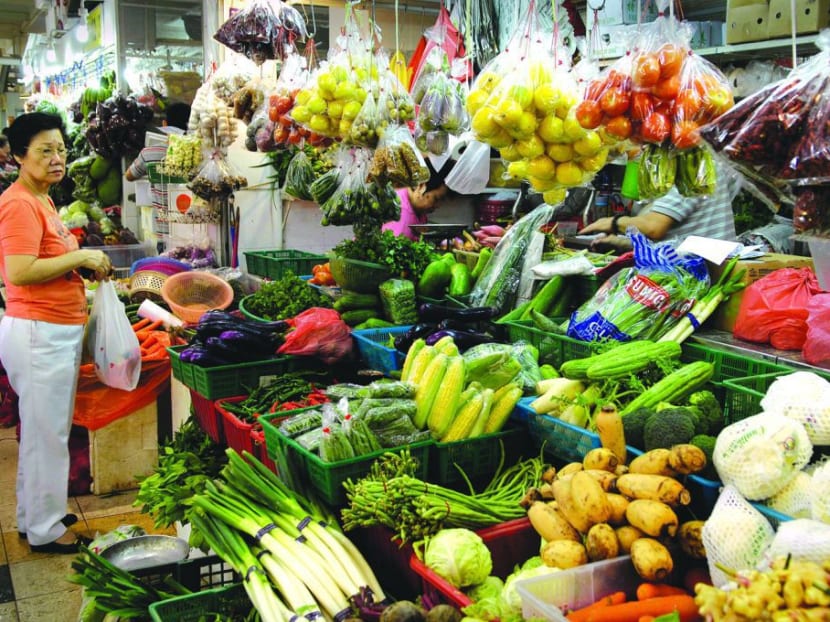Vegetable supplies dipping, could get costlier for Chinese New Year
SINGAPORE — The prices of some vegetables here have climbed 80 to 150 per cent in the past week, and may continue to remain high through to Chinese New Year next month, as the colder weather hits Malaysian farms and is affecting supplies.

The prices of some vegetables here have climbed 80 to 150 per cent in the past week, and may continue to remain high through to Chinese New Year next month. BLOOMBERG file photo
SINGAPORE — The prices of some vegetables here have climbed 80 to 150 per cent in the past week, and may continue to remain high through to Chinese New Year next month, as the colder weather hits Malaysian farms and is affecting supplies.
The incessant rains and chilly temperatures have caused production to fall at the farms, and some wholesalers and at least one supermarket chain in Singapore are raising prices for the imported vegetables due to the drop in supply.
Prices of vegetables already tend to go up around the Chinese New Year period as families stock up on the produce and push up demand.
Zenxin, a wholesaler at Pasir Panjang Wholesale Centre which also owns a farm in Johor, said that the rains in Malaysia have affected its crops by about 30 per cent. Its executive director Mr Tai Seng Yee said: “There has been no sun for a week, plus the heavy rains, so our supply has been affected. Now we have to import from other countries to balance our supply.”
He added that the supply of certain vegetables could remain poor come Chinese New Year, possibly with a shortfall of about 30 per cent. Prices would go up if this happens. “Some crops need between 20 and 40 days to grow. Leaf lettuce, commonly used for steamboat and other dishes during Chinese New Year, and for lion dance performances, need 35 days.
“To ensure sufficient production, some planning is needed, but we can’t plan for unexpected things like bad weather.”
Wholesalers and importers here approached by TODAY said that given the shortfall in supply, the prices they have to pay for vegetables such as kangkong, chye sim, baby bok choy (xiao bai cai), and lettuce have gone up by 80 to 150 per cent.
Mr Jerry Tan, assistant secretary of the Singapore Fruits and Vegetables Importers and Exporters Association, said: “The cold weather is definitely affecting the supply. Prices are already going up. Compared to last week, the prices of certain vegetables have increased by 80 to 100 per cent. That’s quite a lot.”
Mr Tan, who is also the executive director of Hu Lee Impex, an importer and wholesaler of fresh produce, added that it has had to source from other countries such as China, Thailand or Taiwan. The company is monitoring the supply situation day by day, but on Monday (Jan 15), it raised prices by the same quantum (80 to 100 per cent).
Sheng Chai Vegetable Supplier, a wholesaler based at Pasir Panjang WholeSale Centre, is selling vegetables at higher prices to coffee shops, for instance. Owner Lim Lian Chai said: “We usually pay (the farmers) S$1 to S$1.20 per kilogramme for kangkong. Now it has gone up to S$3. It’s the same for chye sim.
“We are raising prices, but we can’t raise too much. Even if it goes up to S$3.50, they (coffee shops) will complain. I’m going to be making losses for sure.”
It has been reported in Malaysia that market prices for vegetables may rise in Singapore ahead of Chinese New Year. In Cameron Highlands, Malaysia’s largest production centre for vegetables with 2,000 farms, temperatures have dropped from a mean of 18°C to 13°C. The frequent rain and lack of sunshine have slowed the growth of the crops.
The Star reported that, in Johor, farmers are reporting a 30 per cent drop in yield, which has resulted in the prices of some vegetables going up by 50 to 100 per cent.
GETTING SUPPLY FROM DIFFERENT SOURCES
Supermarkets here contacted by TODAY said that they are not raising prices for now, except for Sheng Siong. Its spokesperson said that the increased prices was because prices for vegetables from Malaysia, including kangkong and chye sim, have gone up. “Besides doing our best to keep any price increment reasonable, we also diversify our sources, by sourcing from China, Thailand, and Vietnam for leafy and (non-leafy) vegetables so as to maintain price stability.”
NTUC FairPrice, Cold Storage and Giant said that they are maintaining prices.
Mr Peter Teo, director of fresh products at FairPrice, explained that its “source diversification strategy” ensures a stable supply and moderate costs for essential goods.
“Apart from Malaysia and Singapore, we also source vegetables from other locations including Thailand, China and Indonesia. This also applies to our fruit sources. For example, while supplies of bananas from Malaysia have been affected, we continue to keep a steady supply for the fruit from The Philippines, Ecuador, and Mexico,” he said.
It is similar for Cold Storage and Giant, which said that supply is stable as they work directly with the farms in Malaysia, and they practise “diversified sourcing”.
TODAY understands that for some businesses, long-term contracts are in place to guard against short-term price fluctuations for fresh produce.






